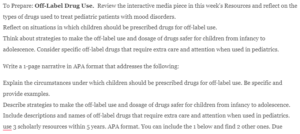
To Prepare: Off-Label Drug Use. Review the interactive media piece in this week’s Resources and reflect on the types of drugs used to treat pediatric patients with mood disorders.
Reflect on situations in which children should be prescribed drugs for off-label use.
Think about strategies to make the off-label use and dosage of drugs safer for children from infancy to adolescence. Consider specific off-label drugs that require extra care and attention when used in pediatrics.
Write a 1-page narrative in APA format that addresses the following:
Explain the circumstances under which children should be prescribed drugs for off-label use. Be specific and provide examples.
Describe strategies to make the off-label use and dosage of drugs safer for children from infancy to adolescence. Include descriptions and names of off-label drugs that require extra care and attention when used in pediatrics.
use 3 scholarly resources within 5 years. APA format. You can include the 1 below and find 2 other ones. Due August 10
https://www.ncbi.nlm.nih.gov/pmc/articles/PMC5736254/
Here is a sample:
Off-Label Drug Use
Student’s Name:
Institutional Affiliation:
Course:
Instructor:
Date:
Off-Label Drug Use.
One of the most common cases in which children are administered drugs for off-label use is when there is no availability of licensed, standard, effective, and approved drug options for specific conditions or diseases among children or when there is no consistent pediatric information on the specific condition affecting our pediatric patients (Allen et al.,2018). The failure of standard therapy can also be a reason for the introduction of alternative forms of therapy for children in specific age groups, while the lack of clinical trials for specific age groups, including children, can contribute to the use of off-label drugs in the presence of significant evidence of the effectiveness of off-label drugs. Such drugs can also be introduced to pediatric patients (Allen et al., 2018). For instance, in the case of a pediatric patient suffering from depression, off-label drugs can be recommended if already approved medications are not effective in helping the pediatric patient deal with their depression.
The provision of a clear guideline on when healthcare providers can administer off-label drugs is one of the most effective strategies that can help to make it safer for children and adolescents to receive and benefit from such drugs while not being at risk of adverse side effects (AlAzmi et al., 2020). Healthcare practitioners need to receive guidelines on the specific situations where they should recommend off-label drugs, such as only in cases where an already approved medication does not work or the off-label drug being recommended is supported by sufficient scientific evidence. The administration of different Off-label drugs may therefore be required among patients, including Alfentanil, atropine, cefepime clozapine, Cidofovir, and Ciprofloxacin Ceftazidime and Clozapine(AlAzmi et al., 2020).
References
Allen, H. C., Garbe, M. C., Lees, J., Aziz, N., Chaaban, H., Miller, J. L., Johnson, P., & DeLeon,
- (2018). Off-Label Medication use in Children, More Common than We Think: A Systematic Review of the Literature. The Journal of the Oklahoma State Medical Association, 111(8), 776–783.
AlAzmi, A., Alasmari, Z., Yousef, C., Alenazi, A., AlOtaibi, M., AlSaedi, H., AlShaikh, A., AlObathani, A., Ahmed, O., Goronfolah, L., & Alahmari, M. (2020). Off-Label Drug Use in Pediatric Out-Patient Care: A Multi-Center Observational Study. Hospital Pharmacy, 56(6), 690–696. https://doi.org/10.1177/0018578720942226